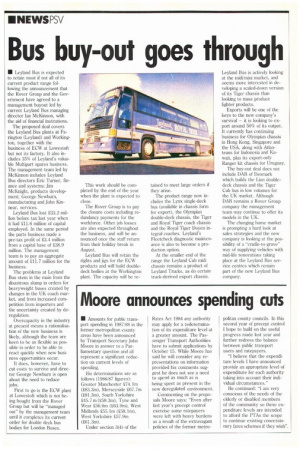Bus buy-out goes through
Page 17

If you've noticed an error in this article please click here to report it so we can fix it.
• Leyland Bus is expected to retain most if not all of its current product range following the announcement that the Rover Group and the Government have agreed to a management buyout led by current Leyland Bus managing director lan McKinnon, with the aid of financial institutions.
The proposed deal covers the Leyland Bus plants at Farington (Leyland) and Workington, together with the business of ECW at Lowestoft but not its factory. It also includes 35% of Leyland's valuable Multipart spares business. The management team led by McKinnon includes Leyland Bus directors Eric Turner, fmance and systems; Jim McKnight, products development; George Newburn, manufacturing and John Kinnear, services.
Leyland Bus lost 233.2 million before tax last year when it had 211.6 million of capital employed. In the same period the parts business made a pre-tax profit of 23.4 million from a capital base of &:38.9 million. The management team is to pay an aggregate amount of 211.7 million for the business.
The problems at Leyland Bus stem in the main from the disastrous slump in orders for heavyweight buses created by changes in the UK coach market, and from increased competition from importers and the uncertainty created by deregulation.
Overcapacity in the industry at present means a rationalisation of the new business is likely, although the team are keen to be as flexible as possible in order to be able to react quickly when new business opportunities occur.
It does, however, have to cut costs to survive and director George Newburn is open about the need to reduce jobs.
First to go is the ECW plant at Lowestoft which is not being bought from the Rover Group but will be "managed out" by the management team until it completes its current order for double deck bus bodies for London Buses. This work should be cornpleted by the end of the year when the plant is expected to close.
The Rover Group is to pay the closure costs including redundancy payments for the workforce. Other job losses are also expected throughout the business, and will be announced once the staff return from their holiday break in August.
Leyland Bus will retain the rights and jigs for the ECW products and will build doubledeck bodies at the Workington plant. The capacity will be re taMed to meet large orders if they arise.
The product range now includes the Lynx single-deck bus (available in chassis form for export), the Olympian double-deck chassis, the Tiger and Royal Tiger coach chassis and the Royal Tiger Doyen integral coaches. Leyland's Fleetcheck diagnostic maintenance is also to become a production option.
At the smaller end of the range the Leyland Cub midi chassis remains a product of Leyland Trucks, as do certain truck-derived export chassis. Leyland Bus is actively looking at the midi/mini market, and seems more interested in developing a scaled-down version of its Tiger chassis than looking to mass produce lighter products.
Exports will be one of the keys to the new company's survival — it is looking to export around 50% of its output. It currently has continuing business for Olympian chassis in Hong Kong, Singapore and the USA, along with Atlanteans for Indonesia and Kuwait, plus its export-only Ranger kit chassis for Uruguay.
The buy-out deal does not include DAB of Denmark which builds the Lion doubledeck chassis and the Tiger Cub bus in low volumes for the UK market. Although DAB remains a Rover Group company the management team may continue to offer its models in the UK.
The changing home market is prompting a hard look at sales strategies and the new company is looking at the possibility of a -cradle-to-grave" way of supplying vehicles with mid-life renovations taking place at the Leyland Bus service centres which remain part of the new Leyland Bus company.












































































